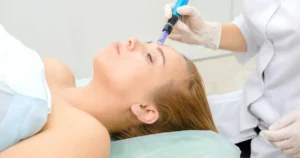Laser treatments have revolutionized skincare, offering targeted solutions for various concerns, from acne to aging. Unlike traditional methods that often require downtime or invasive procedures, these advanced therapies use precise light energy to improve skin health. Whether you’re looking to diminish scars, erase tattoos, or rejuvenate your complexion, there’s a laser treatment tailored to your needs.
Laser Treatments Overview
Laser treatments harness the power of light to target various skin issues, offering a non-invasive way to improve skin appearance. These treatments work by directing concentrated light to the skin, which can be adjusted to address different concerns. For instance, some lasers focus on the upper layer of the skin to treat issues like fine lines, sun damage, and scars, promoting new skin cell growth for a fresher, more youthful look. Others target deeper layers to address more stubborn problems, such as deep-set wrinkles or loss of skin elasticity, by stimulating collagen production, which is key to maintaining skin’s firmness and smoothness.
Different types of lasers are used depending on the specific skin concern and the desired outcome. For example, ablative lasers remove thin layers of skin and are effective for more pronounced skin issues, while non-ablative lasers, which are less intensive, heat the underlying skin tissue without harming the surface, leading to less downtime. Another type, fractional lasers, treat only a fraction of the skin at a time, making the healing process faster and less painful.
Types of Laser Treatments
Each laser treatment type stands out for its ability to address specific skin issues, from aesthetic enhancements to corrective procedures. Choosing these treatments hinges on thoroughly assessing the individual’s skin condition, type, and treatment objectives.
- Intense Pulsed Light (IPL) Treatments: Commonly referred to as photofacials, IPL treatments use broad-spectrum light to address various skin concerns, including discoloration, sun damage, and minor blemishes. Although technically not lasers, IPL treatments operate on similar principles, making them a versatile option for those seeking improved skin tone and texture.
- Acne and Scar Treatments: Specific lasers are geared towards reducing inflammation, promoting healing, and minimizing the appearance of scars associated with acne. These treatments are dual-purpose, effectively addressing active acne while also working to diminish scars, offering a comprehensive solution for acne-prone skin.
- Pigmentation Correction: For issues like melasma and age spots, there are lasers specifically designed to target and break down unwanted pigmentation. These treatments work overtime to fade dark spots and contribute to a more even skin complexion, addressing pigmentation concerns with precision.
- Scar Revision and Tattoo Removal: Utilizing lasers that can precisely target affected skin layers, these treatments either stimulate the body’s natural healing processes to improve the appearance of scars or break down tattoo ink for natural elimination by the body. Such precision allows for effective correction and removal with minimal impact on surrounding tissues.
- Skin Resurfacing: Addressing aesthetic concerns such as fine lines, wrinkles, and overall skin texture, resurfacing lasers either remove the outermost layers of skin or stimulate deep collagen production. The result is a smoother, rejuvenated skin appearance, reducing signs of aging and improving skin texture.
Choosing the Right Laser Treatment
The process involves several key considerations to ensure that the treatment addresses your concerns effectively and aligns with your skin’s characteristics for optimal results and safety.
- Identify Your Skin Concerns: The first step is to pinpoint exactly what you want to improve about your skin. Is it acne, scars, fine lines, wrinkles, pigmentation issues, or something else? Different lasers are designed to target specific problems, so a clear goal is essential.
- Understand Your Skin Type: Lasers interact differently with skin types and colors. Some laser treatments are better suited for lighter skin tones, while others are safe for use on darker skin. Knowing your skin type helps you select a laser treatment that minimizes risks and effectiveness.
- Consider Your Lifestyle and Recovery Time: Some laser treatments require downtime for recovery, while others have minimal to no downtime. Your ability to take time off work or other activities for recovery may influence your treatment choice.
- Consult with a Professional: This is perhaps the most important step. A consultation with a dermatologist or a certified skin care professional provides valuable insights into which laser treatments are most suitable for your skin type and concerns. They can assess your skin’s condition, discuss potential risks and benefits, and recommend the most appropriate treatment.
- Review Before and After Photos: Looking at the outcomes of others who have undergone similar treatments can provide a realistic expectation of what laser treatments can achieve. It can also clearly communicate your aesthetic goals to your skincare professional.
Preparing for Laser Treatment
Proper preparation helps achieve optimal results, reduces the likelihood of side effects, and facilitates a smoother recovery. Here’s what you should consider before undergoing a laser treatment:
- Consultation with a Skincare Professional: The initial consultation is your opportunity to discuss your goals, concerns, and any medical conditions or medications that could affect the treatment outcome. During this meeting, you’ll receive specific instructions tailored to the type of laser treatment you’ll be undergoing.
- Avoid Sun Exposure: Sunburned or tanned skin can increase the risk of complications from laser treatments. AvoidingIt’s sun exposure and not using tanning beds for at least 4 to 6 weeks before treatment is generally recommended. If you must be in the sun, use a broad-spectrum sunscreen with an SPF of 30 or higher.
- Skin Care Products: Certain products, especially those containing retinoids, alpha hydroxy acids (AHAs), beta hydroxy acids (BHAs), or other exfoliating agents, may need to be discontinued several days to weeks before your treatment. These products can increase skin sensitivity, potentially leading to adverse reactions.
- Medications: Inform your skin care professional about all your medications, including over-the-counter drugs and supplements. Some medicines, like aspirin or other blood thinners, may need to be paused because they can increase the risk of bruising. Likewise, medications that make your skin more sensitive to light should be discussed.
- Shaving: Depending on the treatment area, you should shave the day before to reduce the risk of burns from excess hair. However, this can vary, so follow the specific guidance given by your skincare professional.
- Eating and Drinking: You can eat and drink as usual before the procedure for most laser treatments. However, staying well-hydrated and avoiding alcohol a few days before the treatment can help improve your skin’s reskin’s process.
- Arriving Makeup-Free: If your face is in the treatment area, come to your appointment without makeup, moisturizers, or any other products on your skin. This reduces the risk of irritation and allows the laser to work more effectively.
Takeaway
Noble Clinic is here to guide you through achieving the flawless complexion you’ve always desired. Our team utilizes the latest laser treatment technologies to address various skin concerns, ensuring personalized care tailored to your needs. Whether you’re looking to diminish signs of aging, correct imperfections, or enhance your skin’s natural beauty, we’re committed to delivering exceptional results in a comfortable and welcoming environment. Contact Noble Clinic today to schedule your assessment and discover the perfect laser treatment.





